Observations: Breakaway
Thanks to Martin Daoust and others
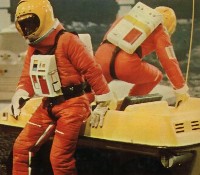
This shot, seen on the back of the UK Orbit edition of Breakaway and the German novel Unbekannte Invasoren, shows astronauts with red rectangles where the numbers should be. The moonbuggy is missing some decoration, including the striped bar around the sides and boxes. There is no cargo in the back of the buggy. This is evidently a dress rehearsal. When filming started, the astronaut packs had numbers and the moonbuggy decoration was completed. This scene was filmed from Monday 3 December 1973 to Wednesday 5th, but this shot could well have been taken at the end of the previous week.
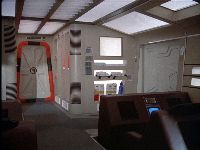
One of the red backpacks appears in Koenig's Eagle when it lands. The one alongside it has a black number plate; on the other side there are two more packs, one with a black plate, the other possibly red with a number. Thanks to Patrick Zimmerman.
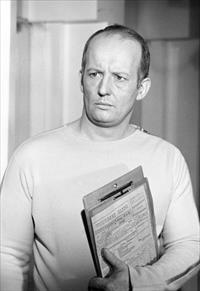
Michael Sheard as Gundlach, chief of the nuclear waste depot. He was filmed, but cut from the episode. The audio for his scene can be heard here. The scene:
Helena asks: "Are they normally out there as long as this?"
Gundlach answers: "One hour is the limit. Just as a precaution. But until recently we have never had any accidents"
Bergman: "So far their brain activity seems to be normal."
Helena: "So far. But if there's any variation, any variation at all, I'm pulling them out."
Technician Nordstrom: "Unit twenty three reporting. Radiation count - normal."
Morrow appears on the TV screen: "Dr. Russell, Professor Bergman"
Bergman: "Yes."
Morrow: "Commander Koenig's E.T.A. is in thirty minutes ... at two three three five."
Helena: "Thank you, Paul." She turns back to Bergman. "I hope he's the right man."
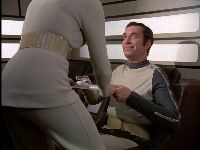
Koenig enjoys the stewardess service, a sequence obviously inspired by 2001: A Space Odyssey. There is a galley section before the cockpit door (we see it in The Full Circle). Where does the stewardess sit? Not with the pilots (who are fully suited in the cockpit), and evidently not in the empty seats alongside Koenig. There are actually two different stewardesses, played by Lea Dregorn (in space) and Laurie Davis (landing).
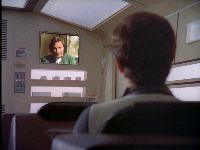
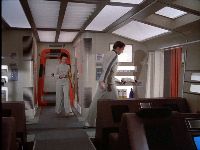
When Simmonds calls Koenig on the Eagle, there are boxes under the passenger module screen. When Koenig leaves the Eagle, there are spacesuit packs.
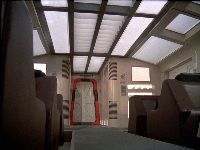

Another difference between the Eagle 2 passenger module set in the 2 sequences: there is no number on the module door when the stewardess first appears (the cockpit door has the number "3"), but when they land, the module door has the number "4", and the cockpit door has the number 6. Thanks to Richard Totis.
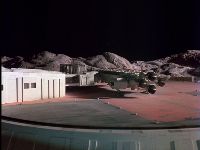

Koenig's Eagle lands on Alpha with port side to boarding tube. Koenig leaves out the starboard side.
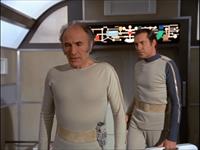
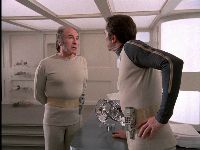
In the travel tube and Alpha corridor, Bergman's commlock has the screen hood angled towards his body (the opposite to Koenig's). In Main Mission and the Command Office, the screen hood has turned round. Thanks to Richard Totis.
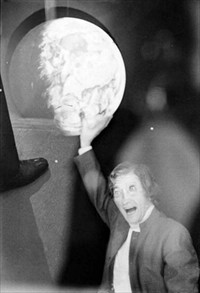
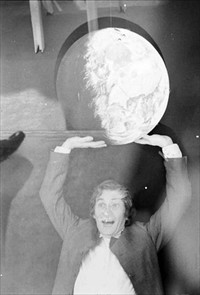
Behind the scenes: Roy Dotrice (without beard- that was make-up) holding up the Earth. This is a reflection against the slanted glass of the Main Mission windows (a foot is visible left, and the legs of a Gaudi chair top). The Earth is the cut-out seen through the Main Mission windows.
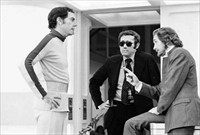
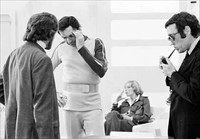
Behind the scenes: Dotrice, Landau and director Lee Katzin, with Babara Bain in the background. Dotrice, now with beard, is wearing his Earth suit, because this is the scene when Koenig talks to Simmonds on the communications post. Dotrice was filmed live by a television camera on an adjacent set.
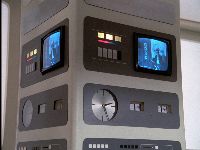
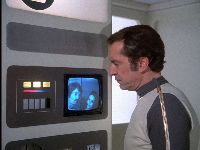
It would be difficult to calculate real times for the clocks seen on communications posts, so most in the series have stopped. During Koenig's conversation with Simmonds, the film crew attempted to update the times realistically: the conversation starts at 2:26, and we see it proceed to 2:27. Unfortunately it breaks down when, after a short pause, Koenig calls Paul: the time is now 3:53. Thanks to Craig Rohloff.
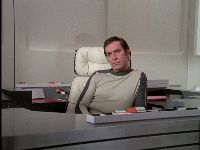
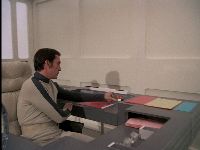
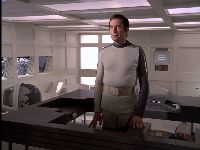
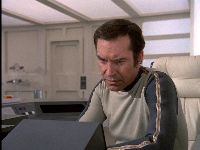
Koenig tries to call Helena on his desk screen, and talks to Mathias. In other shots in the episode, the screen is not there. In following episodes it is always seen on the desk. Thanks to Glenn McCrabb.
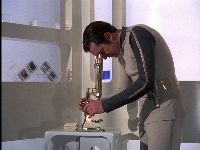
Koenig looks at Helena's microscope. "Donnelmeyer, 1887. As used by Louis Pasteur and Madame Curie." "It's a replica. A college prize.". This is a brass compound binocular microscope. Pasteur was active 1840s-1895, Marie Curie 1890s-1934. The prop is probably a replica from the Science Museum in London. It is remarkable that Koenig knows the name and year; no microscope maker of that name (or similar) has been identified. A brass compound microscope used by Pasteur is in the London Science Museum, made by Nachet et fils, dated 1861-1870; the Musee Pasteur also has a Nachet microscope used by Pasteur. There is a German-American microscope maker named Joseph Zentmayer, famous for US Army Hospital microscopes, and an German-English lens maker named J.H.Dallmeyer, noted for telescopes and photographic lens as well as microscopes, who died in 1883, but whose son, Thomas Dallmeyer, continued the business. An associate of Dallmeyer, Thomas Ross, was one of the top microscope makers in Victorian England, and also produced a famous Ross-Zentmayer microscope in 1885. Helena's microscope looks closer to an 1877 J.H. Dallmeyer brass binocular microscope with rackwork by Ross.
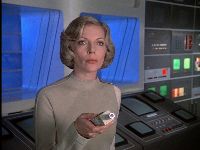
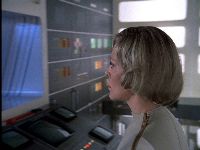
Helena turns to the communications post, asking computer to verify the last report. When she turns back, all the computer panels on the wall behind her have been changed. On the console, a label has disappeared from the screens, and the Pio Manzu tray on top has changed from white to red. It's likely this scene was reshot later, and the set was rebuilt with these minor differences.
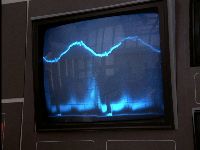
When Ouma shows Koenig the flight recording, the scene opens with a close up of the screen, on which reflections can be seen. Top right is the microphone. Bottom right is the square lens cover of the camera. On the left side near the top is the reflection of a lighting shroud. Standing alongside the camera is a man wearing glasses- it looks like Lee H Katzin. Thanks to David Penn.
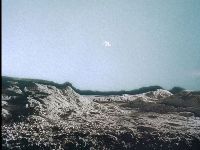
Flashes of light illuminate the sky as Koenig flies to investigate Nuclear Disposal Area One. Which is surprising, as there are no clouds or atmosphere to reflect the light. Notice the black border between the mountains and sky. The foreground is not illuminated by the flashes, and the border doesn't match the mountain profile (especially on the right). This may be a matte shot (each half of the shot was filmed separately, with the other half masked by the matte). Normally shots were filmed by double-exposing the film, without mattes.
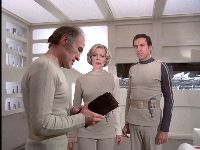
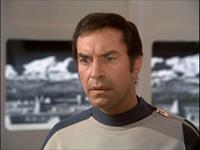
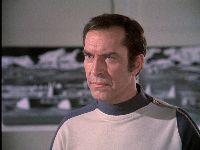
Koenig asks "How much time do we have?". Bergman says "We need solid data on magnetic levels" and Helena won't be responsible for more men on the surface. The final shot of Koenig, as he says "We equip an Eagle to monitor magnetic levels and do it by remote control." is different to the other shots of him. It is a later re-shoot, with a different background (see the moonbase diorama behind the windows), different hair, and a different exposure. The original scene 68 (filmed on 11 December 1973) ended with Koenig calling an operator to pass emergency code Alpha One, something that will happen only after the Eagle crash in the next sequence. Thanks to Simon.
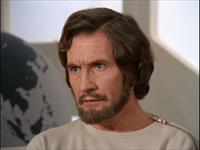
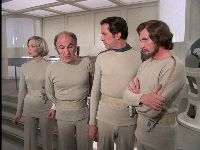
In Koenig's office, close up shots of Simmonds show his shoulder zip lying up against his neck. In long shots, it is lying down. Thanks to Patrick Zimmerman. The globe beyond has rotated - in long shot, central America is seen, but the Simmonds close ups show the South China Sea, literally the opposite side of the globe.
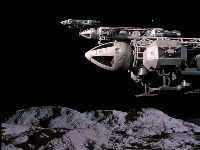
The three Eagle models- 44inch, 22inch and 11inch - seen together. Notice the middle Eagle is missing the manoeuvring rockets on the front leg pod. Thanks to David Penn.
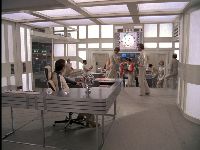
Notice there are floor mats to the front and side of the Command Desk. The mats are covering the start position of the camera, to the side of Koenig (protecting the floor tiles?).
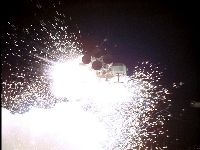
As the explosion spreads to the Eagle, the wires holding it are briefly visible above. Also, for a few frames, you can just make out the top of a black screen curving along the top of the screen. Thanks to James. C
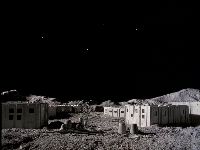
Moonbase buildings during the breakaway. |
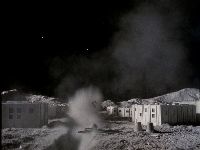
A crevasse opens up. The buildings to the right shift several metres. |
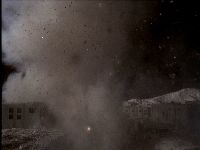
A huge plume of dust explodes up. Underground pipes and corridors must be torn open and exposed to space. |
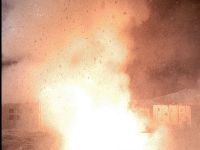
A fiery explosion. The episode cuts away before returning to this. Look how far to the right the buildings have moved. Part of this sequence is repeated in Force Of Life. |
||
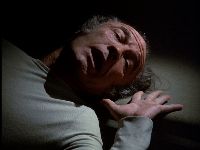 |
At the start of the Breakaway, Bergman falls onto his back, at the top of the steps... |
|
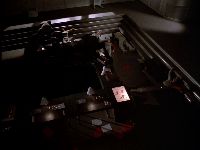 |
In this shot he has turned onto his front... |
|
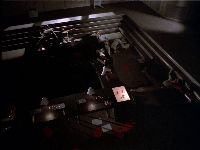 |
Now he has turned face up again and dropped down one step (everyone else is in the same position)... |
|
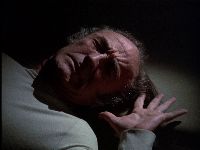 |
But in close up shots, he is back on the top of the steps. |
|

|
During the breakaway, two chairs are thrown up before the windows. There were six before the breakaway, but four seem to have disappeared. | |
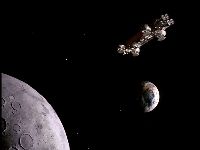 |
During the breakaway, Alan Carter pursues and catches up with the Moon in his Eagle. He is not subject to the G-forces that press the Alphans to the floor of Moonbase Alpha. The Eagle would be dragged by the Moon's gravity (the same forces that tear apart the Space Dock), so the Eagle's engines need not match the acceleration of the breakaway explosion. The Eagles and Moonbase both have "artificial gravity", but the Eagle systems are smaller and stronger (they provide full gravity in space), and so can compensate better. |
|
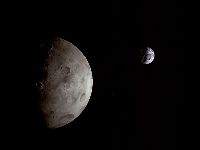 The Moon leaves Earth orbit. |
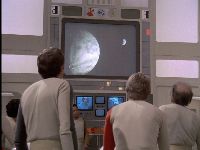 The Moon leaves Earth orbit as seen from the Mars satellite. The shot is framed exactly the same way, but it's a different Moon. There's a distinct crater with rays in the lower hemisphere that wasn't there in the earlier shot. |
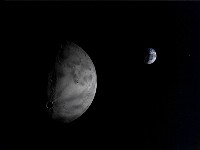 The Moon leaves Earth orbit as seen in the Year One titles. It's the same moon as seen by the Mars satellite. |
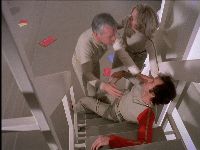
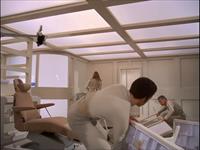
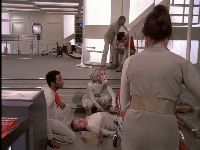
In Main Mission, medic Lew Hooper helps injured Paul Weston. We cut to Medical to see Mathias and medic Lew Hooper cleaning up. We cut back to Main Mission, where Lew Hooper is still helping Weston as the nurses arrive.

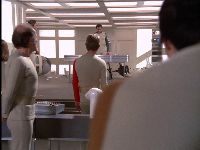
Koenig's chair has fallen to the far right wall. When Koenig walks to his desk to make his announcement. The chair is now partially inside his desk - still on its back. If someone moved the chair, why leave it on its back?
Copyright Martin Willey